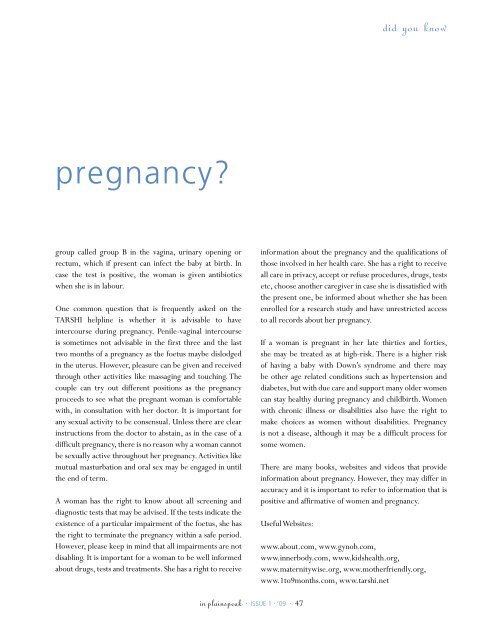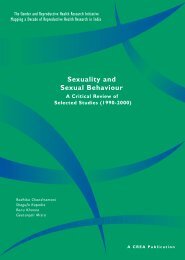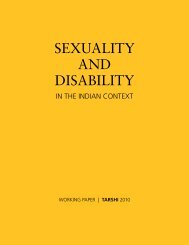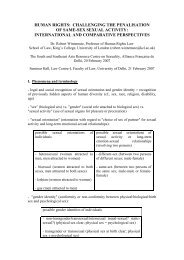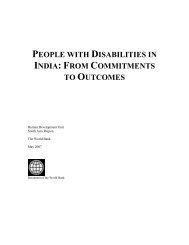Download Pdf - TARSHI
Download Pdf - TARSHI
Download Pdf - TARSHI
You also want an ePaper? Increase the reach of your titles
YUMPU automatically turns print PDFs into web optimized ePapers that Google loves.
did you know<br />
pregnancy?<br />
group called group B in the vagina, urinary opening or<br />
rectum, which if present can infect the baby at birth. In<br />
case the test is positive, the woman is given antibiotics<br />
when she is in labour.<br />
One common question that is frequently asked on the<br />
<strong>TARSHI</strong> helpline is whether it is advisable to have<br />
intercourse during pregnancy. Penile-vaginal intercourse<br />
is sometimes not advisable in the first three and the last<br />
two months of a pregnancy as the foetus maybe dislodged<br />
in the uterus. However, pleasure can be given and received<br />
through other activities like massaging and touching. The<br />
couple can try out different positions as the pregnancy<br />
proceeds to see what the pregnant woman is comfortable<br />
with, in consultation with her doctor. It is important for<br />
any sexual activity to be consensual. Unless there are clear<br />
instructions from the doctor to abstain, as in the case of a<br />
difficult pregnancy, there is no reason why a woman cannot<br />
be sexually active throughout her pregnancy. Activities like<br />
mutual masturbation and oral sex may be engaged in until<br />
the end of term.<br />
A woman has the right to know about all screening and<br />
diagnostic tests that may be advised. If the tests indicate the<br />
existence of a particular impairment of the foetus, she has<br />
the right to terminate the pregnancy within a safe period.<br />
However, please keep in mind that all impairments are not<br />
disabling. It is important for a woman to be well informed<br />
about drugs, tests and treatments. She has a right to receive<br />
information about the pregnancy and the qualifications of<br />
those involved in her health care. She has a right to receive<br />
all care in privacy, accept or refuse procedures, drugs, tests<br />
etc, choose another caregiver in case she is dissatisfied with<br />
the present one, be informed about whether she has been<br />
enrolled for a research study and have unrestricted access<br />
to all records about her pregnancy.<br />
If a woman is pregnant in her late thirties and forties,<br />
she may be treated as at high-risk. There is a higher risk<br />
of having a baby with Down’s syndrome and there may<br />
be other age related conditions such as hypertension and<br />
diabetes, but with due care and support many older women<br />
can stay healthy during pregnancy and childbirth. Women<br />
with chronic illness or disabilities also have the right to<br />
make choices as women without disabilities. Pregnancy<br />
is not a disease, although it may be a difficult process for<br />
some women.<br />
There are many books, websites and videos that provide<br />
information about pregnancy. However, they may differ in<br />
accuracy and it is important to refer to information that is<br />
positive and affirmative of women and pregnancy.<br />
Useful Websites:<br />
www.about.com, www.gynob.com,<br />
www.innerbody.com, www.kidshealth.org,<br />
www.maternitywise.org, www.motherfriendly.org,<br />
www.1to9months.com, www.tarshi.net<br />
in plainspeak · ISSUE 1 · ‘09 · 47


